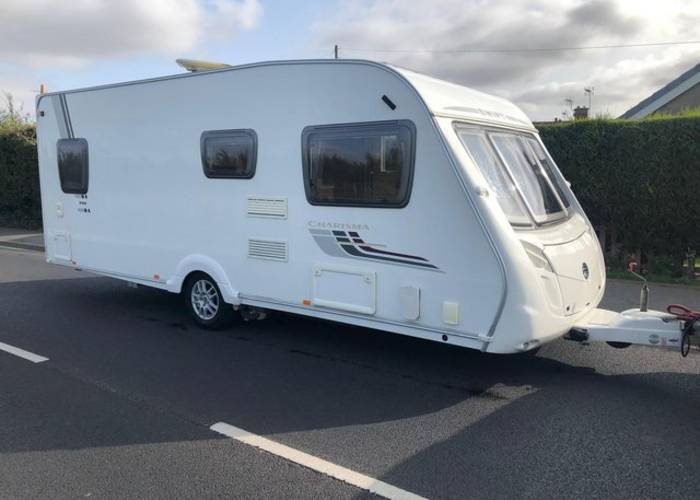What are the regulations for keeping a touring caravan on your land? Are there property laws you need to consider? In most cases, you are within your rights to keep a touring caravan on your land. However, as with any property laws, there are requirements and exceptions. Here is what you need to know about parking your touring caravan at home.

Table of Contents
Can I Keep My Caravan in the Drive or Garden?
Yes, in most cases, a mobile home or touring caravan is allowed to stay parked on your drive or in your garden. Note that this only applies to caravans and similar structures that are mobile. The regulations for a static caravan are different.
To be considered a mobile structure it must meet the legal definition. Under UK law, a touring caravan is a habitable structure that can be moved and is maximum 20 metres long, 6.8m wide and 3.05m tall. Mobile structures that are larger are subject to different regulations.
Aside from the size of the caravan, the use of the caravan is also a deciding factor. The touring caravan is allowed to stay on your property if it is used as an extension of the home. Examples of uses are as an extra bedroom or as a bathroom because of plumbing issues in the main home. If the land is empty but you are in the process of building a stationary home then you are also allowed to use the touring caravan as your temporary main dwelling.
Even though touring caravans are allowed to remain on your private drive or garden, there are exceptions. Check with your local council to make sure that your housing permissions allow for the long-term parking of a touring caravan. Densely built urban areas may not approve of touring caravans being parked long-term.
What Should I Remember When Parking My Caravan in the Drive or Garden?
If you are parking a caravan in your drive, check the layout of your street. Take into consideration that a touring caravan is larger than most cars. It might create an obstruction for the traffic in the street or for the view of your neighbours.
A parked touring caravan may not create an obstacle on either footpaths or roads. Also, make sure that the position of the caravan does not block the view for passing vehicles or pedestrians. This is especially important in winding streets. Your caravan can’t be a traffic nuisance.
If the placement of your caravan does form an obstacle for passing traffic or your neighbours, then your neighbours can report it to the council. The council will then decide whether your caravan is in an appropriate spot.
Another factor to remember is council taxes. As long as it is not a static caravan and the caravan is used as an extension of the main home, then you will not need to pay taxes. You will only need to pay taxes when the caravan functions as a separate self-sufficient dwelling. Certain planning permissions will then also apply.
When Am I Not Allowed to Put a Touring Caravan on My Land?
You are not allowed to keep a touring caravan on your land as a permanent and separate dwelling. Meaning, whomever is using the caravan must still be using the main home as their main residence. The users of the caravan must be residents of the main home.
A touring caravan is not allowed to be used as a separate self-sufficient home. For example, having a family member live in the touring caravan as their main residence is not legal. Having two different main residences on the same property requires planning permissions.
Also, the touring caravan may not be let to others whether it is done privately or through on-line platforms such as Airbnb. Again, you will need different planning permissions to do so. This regulation is related to the law that prohibits a structure to be used as a place of business when the land use is only intended for housing.
When Do I Need Planning Permissions for a Caravan?
If you want to place a touring caravan on your own property but anywhere other than your garden or drive, you might need planning permissions. For example, storing a caravan on farm land might need different planning permissions. Remember, you are allowed to keep your own touring caravan on your own drive or garden. Allowing someone else, a non-resident of your home, park their touring caravan for a long period of time is not covered by the same regulations.
Also, if you are the owner of a large piece of land that includes a protected nature area, you will need planning permissions. This only applies if your touring caravan is to stay parked anywhere other than your drive.
As mentioned, you will need planning permissions to use the touring caravan as a separate self-sufficient home. You will also need planning permissions to let the caravan.
Is It Better to Store My Caravan at Home?
Every caravan owner will have to answer this question. Is it better to keep your caravan parked in the drive or garden or should you put it in storage? The answer will depend on your own situation.
If you are allowed to keep your touring caravan in your drive or garden, keeping the caravan at home could save you the cost of storage fees. This also makes it easier for you to perform maintenance.
On the other hand, you should consider whether it is appropriate to keep your caravan at home. Will the caravan form a nuisance for yourself or for your neighbours? If you would like to keep it at home, consider applying for a certificate of lawfulness. This is a document you can request for from your local council that states that your touring caravan meets all the legal requirements to stay parked on your land. This way, you can prove to your neighbours that your are well within your rights.